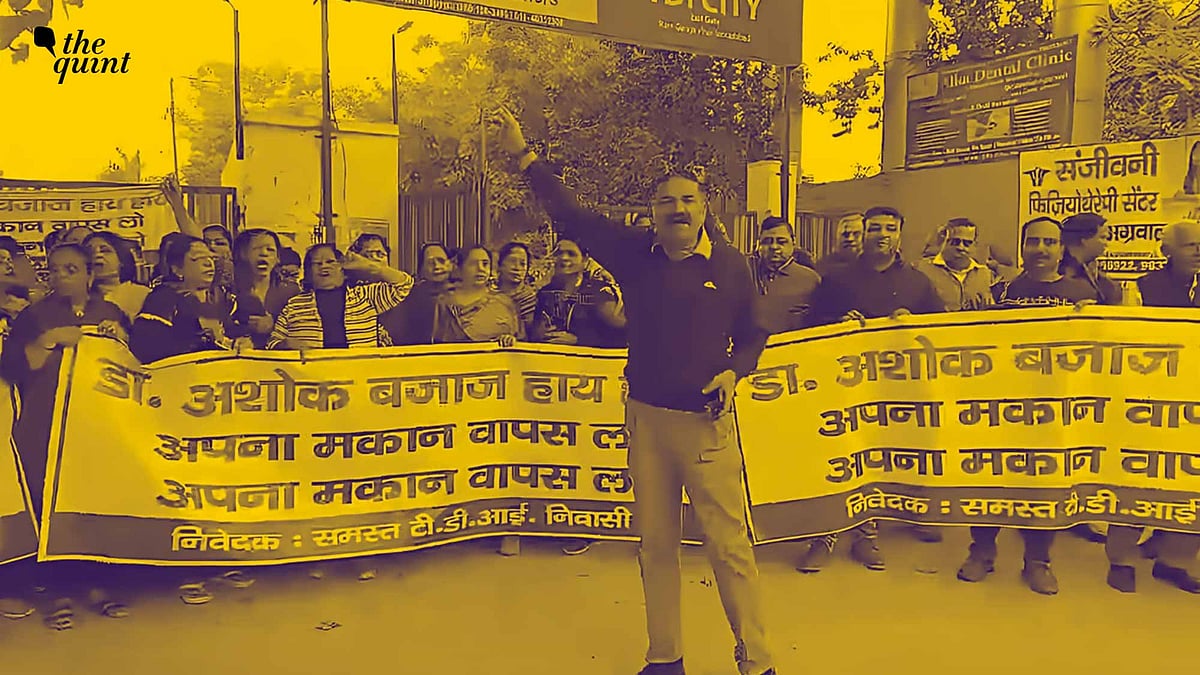
Moradabad Protest: Muslim Couple's Forced Eviction Spotlights Spatial 'Othering'
The incident reflects how deeply entrenched the Hindu right constructing Muslims as the 'other' has become.

advertisement
Discrimination against Muslims in India has reached a crescendo where even fundamental rights like housing have become a battleground for asserting religious dominance and exclusion. The recent case in Uttar Pradesh's Moradabad, where Hindu residents forced a Muslim couple to vacate their newly purchased home, is far from an isolated incident. Instead, it serves as a stark reminder of the pervasive Islamophobia that plagues Indian society in the current times.
The residents' brazen claims that they “cannot tolerate a Muslim family living right in front of the local temple” and that it poses a “question of the safety of women” reflects how deeply entrenched the Hindu right's longstanding project of constructing Muslims as the “other” has become.
Cautioning this in his recent paper, Recognising Hindu Orientalism, Irfan Ahmad insightfully examines the roots of this construction of the Muslim identity through the lens of Hindu nationalism. Ahmad argues that Hindu nationalism, in its modern form, has developed an ideological framework that casts Muslims as “foreign” and inherently “violent.” His narrative draws heavily from colonial representations, particularly the British orientalists’ depiction of Muslims as culturally distinct and threatening.
How the Law Reinforces the Existing Social Hierarchies
This unfounded and violent portrayal of Muslims as both foreign and an aggressive group continues to marginalise them within the imagined Hindu identity of India, undermining the primordial constitutional ideals of equality, liberty, and fraternity. Ironically, the legal framework intended to protect often reinforces existing social hierarchies. While spatial discrimination against Muslims has existed for a long time, the rise of Hindu nationalist politics has fostered an environment where such discrimination is normalised and, in some cases, institutionalised.
For instance, Christophe Jaffrelot explains in a 2018 article in The Indian Express how the Disturbed Areas Act of 1991 has been used in Gujarat to enforce the segregation of Muslims from other communities.
Initially designed to prevent distress sales and forced property transactions in riot-affected areas, Jaffrelot argues that the law enabled “Muslims to sell their properties to Hindus but barred Hindus from selling to Muslims.” Alarmingly, 40 percent of Ahmedabad was declared "disturbed.”
Legal endorsement of spatial discrimination was further cemented in the 2005 case Zoroastrian Co-operative Housing Society Ltd. v. District Registrar, Co-operative Societies.
In a clear contradiction to the Indian Constitution's non-discrimination guarantee under Article 15(2), the Supreme Court upheld a housing society's right to lease or sell property exclusively to members of a specific religious community (in this case, Parsis), invoking the freedom of association under Article 19(1)(c). Housing societies in India are, therefore, serving as proxies for religious and caste-based segregation.
Prejudices Affect Muslims More Than Dalits
Some studies have found that housing prejudices disproportionately affect Muslims more than Dalits, often confining them to ghettos or areas on the periphery of urban centers.
In a 2015 article in Economic and Political Weekly titled 'Urban Rental Housing Market: Caste and Religion Matters in Access,' Sukhadeo Thorat et al revealed that "house owners in the National Capital Region of Delhi deny housing to both Dalits and Muslims, with Muslims facing greater discrimination."
The tragic paradox: on the one hand, Muslims are often forced to live in segregated clusters, effectively ghettoising them; yet on the other hand, Muslims face discrimination and exclusion when attempting to find a house in the mainstream housing clusters.
The recent Moradabad incident exemplifies this irony – damned if you do, damned if you don’t. Undeniably, the ghettoisation of the Muslims is a direct consequence of the extreme violence and discrimination.
The Indian constitutional jurisprudence, built on the principles of equality, freedom, and secularism, often stands in sharp contrast to the lived realities of Muslims, who are blatantly treated as second-class citizens.
In the recent “bulldozer” ruling, the Supreme Court reiterated the right to shelter as “an embodiment of the collective hopes of a family or individuals’ stability and security.” Although discussed in the context of executive actions, the ruling remains largely abstract for Muslims as their homes are the first to be targeted and declared illegal.
The Hindu “other” remains relaxed as long as the imagined threat of the 14% Muslim minority is kept at a distance, clustered in the outskirts of mainstream society.
(Burhan Majid teaches legal and constitutional theory at the School of Law, Jamia Hamdard, New Delhi. He tweets at @burhanmajid. This is an opinion piece, and the views expressed above are the author’s own. The Quint neither endorses nor is responsible for the same.)
- Access to all paywalled content on site
- Ad-free experience across The Quint
- Early previews of our Special Projects
Published: undefined